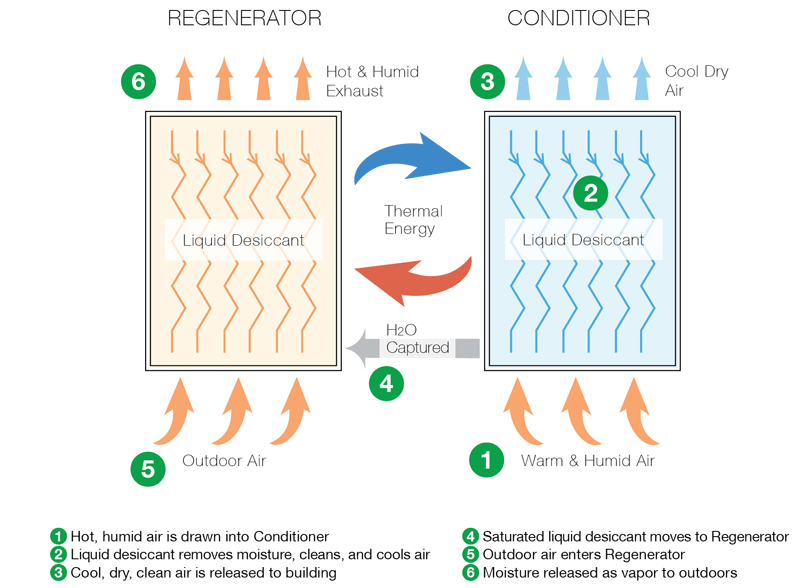Air conditioners have been around long enough for all of us to get used to spending huge amounts of electricity on them. Regardless of their energy efficiency rating, air conditioners are responsible for a huge portion of our electricity bill. Those who use them in the winter spend even more, as heating is a more demanding process. Temperature control accounts for a large portion of our energy use, so it was about time that someone invented a more efficient device.
Meet the Salt Water Air Conditioners
Salt water air conditioners aim to reduce energy consumption by half with the introduction of a liquid desiccant. Air conditioning units of this type are a bit different, although many of the operational concepts remain the same.
No Changes in Heating and Cooling
Heating and cooling remain unchanged in salt water air conditioners. You can even find the same components for heating and cooling being used in both traditional and salt water air conditioners. This brings us to the question, “What change makes salt water air conditioners special and how can they reduce the energy bill?”
A New Way of Drying Air
The air that comes through your air conditioner needs to be dried first. Traditionally, this meant that air should be overcooled in the condenser to remove the water and then brought back to the desired temperature. Creating condensation is an energy-demanding process and it is one of the main reasons why air conditioners use so much electricity.
The Use of Desiccant
This is where the desiccant becomes useful. A desiccant is a hygroscopic substance that induces or sustains a state of dryness in its vicinity. Salt water is a prime candidate for desiccation, as it is widely accessible, free of charge, and highly effective. The whole idea is to remove the condenser and let a salt water system do the same thing. Companies such as Advantix Systems have already implemented and patented designs that use liquid desiccant instead of a condenser.
How it All Works
The air conditioning system is constructed by a series of plates with water flowing through them. These multi-layered plates are covered with a special membrane and a salt-based solution is sprayed over them. The salt-based solution takes care of most of the water in the air and it is then recycled. To reuse the same salt-based solution, all you need to do is to heat it up and remove some of the water in it.

How much Better Are They?
Salt water air conditioners offer improvements in the air drying procedure, so their effectiveness will depend on the humidity. Best results can be expected in a high humidity environment, but keep in mind that the concentration of water in the air does not only depend on the weather. The human factor has a big influence, as our bodies let out a lot of water in the air through breathing, sweating and evaporation.
A Best Fit for Commercial Buildings
Businesses, schools and other locations with a high human presence stand to gain the most by installing salt water air conditioners. This is why the models created so far are strictly aimed for commercial use. Any commercial building with a flat rooftop can install this type of air conditioner. The equipment requires a little more space, but hopefully, newer generations will be become smaller.
Saving Round 50% on Energy Use
Current models use between 50 and 75 percent less electricity during the summer and around 50% in the winter. These numbers are nothing to be sneezed at, as the savings can be reinvested in the company and help it to grow at a faster rate.
Possible Residential Use
The demand for air conditioning systems in the residential sector should not be ignored. These current solutions might be too big for residential use, but as technology progresses, salt water air conditioners can find their way into our houses as well. Their energy efficiency can be boosted even further if they are combined with solar power as an alternative source of energy. This was avoided in the commercial models as adding solar power was considered unattractive to clientele. However, residential users may find this idea more appealing.
Conclusion
Salt water air conditioners have been around for some time now, yet we still do not see them installed on every corner. This is due to the fact that they are not a product that is intended for the general public. To achieve greater levels of success, this air conditioning concept will have to make its name in the commercial market. Although salt water air conditioners may have a bright future ahead, business owners firstly need to become aware of the saving potential presented by these devices.
Want more?
Want to find out in what way sustaining our environment impacts our quality of life? We got you covered! Find out more about sustainability and letting go.


Leave a reply